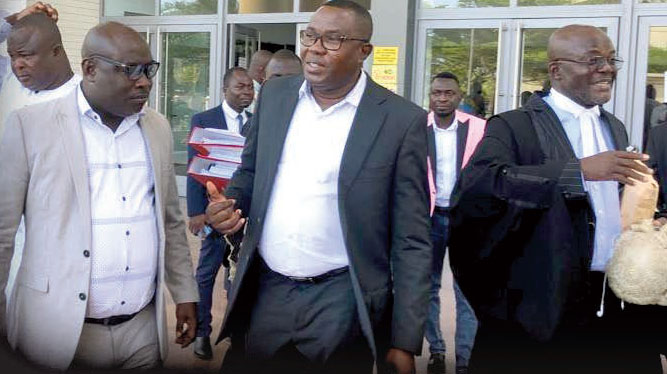Kwaku Boahen, Samuel Ofosu-Ampofo and Tony Lithur leaving the court after the proceedings
The National Chairman of the opposition National Democratic Congress (NDC), Samuel Ofosu-Ampofo, has for the second time failed in his attempt to have the charges against him struck out by an Accra High Court.
Mr. Ofosu-Ampofo, who has been charged with one count of conspiracy to cause harm and two counts of assault against a public officer, had filed an application challenging the constitutionality of the leaked tape which the prosecution intends to rely on for the trial.
The tape reportedly captures how the opposition NDC is allegedly planning to commit crimes in the country and turn round to blame them on the ruling New Patriotic Party (NPP).
Among the strategies are the creation of a general state of insecurity in the country through kidnappings and arson, and verbal attacks on public officials like the Chairman of the National Peace Council, Prof. Emmanuel Asante, and Electoral Commission Boss, Jean Mensa.
The alleged leaked tape is among a list of documents filed by the Office of the Attorney General for the trial of Mr. Ofosu-Ampofo alongside a communication officer of the party, Anthony Kwaku Boahen.
Rights To Privacy
Mr. Ofosu-Ampofo filed a motion urging the court to dismiss the charges as the audio recording which the prosecution intended to rely on was obtained in breach of his rights to privacy.
According to him, the prosecution needed a court order to obtain the audio recording in the manner in which it did and added that since the prosecution failed to do exactly that they cannot rely on it for the trial.
Moving the application, his lawyer, Tony Lithur, argued that if the prosecution was allowed to rely on the audio, then people are at risk as the state could record any person at any time and claim it was trying to prevent a crime.
He said it is dangerous to allow the state to prosecute the leader of the opposition party based on the audio recording, urging the court not to allow the state to set a precedent.
Opposition
The application was opposed by the prosecution led by Director of Public Prosecution, Yvonne Atakora-Obuobisa, who relied on Article 18 of the 1992 Constitution which provides exceptions under which such fundamental human rights can be curtailed.
She said that fundamental human rights are not limitless and where they involve the commission of a crime then that right is taken away.
She told the court that the audio recording which they intended to rely on was already in the public space and the media had reported on it long before the police came in to investigate the matter.
She pleaded with the court to dismiss the application and allow the trial to commence.
Ruling
The court presided over by Justice Samuel K. Asiedu dismissed the application saying it is not different from an earlier one which was also dismissed.
He said the trial had not commenced and the prosecution had not called any witness to show that the trial was based primarily on the audio recording obtained by persons unknown to both the prosecution and the accused persons in violation of the rights of the accused persons.
The case was adjourned to November 18 for the court to consider another application filed by the accused persons.
BY Gibril Abdul Razak


